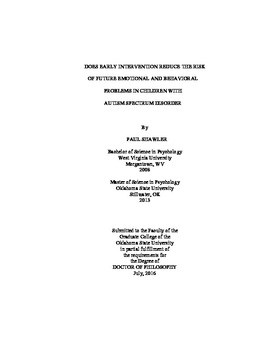| dc.contributor.advisor | Sullivan, Maureen A. | |
| dc.contributor.author | Shawler, Paul | |
| dc.date.accessioned | 2017-02-22T22:10:37Z | |
| dc.date.available | 2017-02-22T22:10:37Z | |
| dc.date.issued | 2016-07 | |
| dc.identifier.uri | https://hdl.handle.net/11244/48869 | |
| dc.description.abstract | Objective: Early Intensive Behavioral Intervention (EIBI) is the leading recommended treatment for children with Autism Spectrum Disorder (ASD). Children with ASD are at a substantially higher risk for developing symptoms associated with additional psychopathology compared to typically developing children. Currently, little is known about the utility of EIBI on symptoms of additional psychopathology. This study aimed to assess if EIBI would serve as a preventative treatment for the development of symptoms associated with additional psychopathology in a sample of young children with ASD. Method: This study was part of a larger multicenter, 2-year, two-arm randomized clinical trial (RCT) evaluating the effectiveness of Project DATA [Developmentally Appropriate Treatment for Autism] Toddler Model, an inclusive based EIBI for young child with ASD, as compared to Services as Usual (SAU). Fifty-one children between the ages of 20 and 35 months with an Autism Spectrum Disorder were assessed at pretreatment and approximately a year into service. Children's intellectual ability, level of ASD symptoms, and emotional and behavioral symptoms were assessed at both assessment points. Results: Groups were equivalent on all dependent variables at pretreatment. A one-way multivariate analysis of variance (MANOVA) did not reveal an overall treatment effect when groups were compared simultaneously across level of ASD symptoms, intellectual functioning, and emotional and behavior symptoms. Univariate analyses demonstrated that EIBI resulted in significantly higher child intellectual functioning compared to SAU at post. No significant differences for level of ASD symptoms or emotional or behavioral symptoms indicative of additional psychopathology were revealed between groups at post. Conclusion: EIBI appears to influence child intellectual functioning, but may not have an effect on other important areas of child well-being. The utility of EIBI for children with ASD and additional psychopathology is discussed. More research is needed to identify the impact EIBI has on children with ASD. Particular focus should be given to symptoms of additional psychopathology and emerging treatments for children with ASD. | |
| dc.format | application/pdf | |
| dc.language | en_US | |
| dc.rights | Copyright is held by the author who has granted the Oklahoma State University Library the non-exclusive right to share this material in its institutional repository. Contact Digital Library Services at lib-dls@okstate.edu or 405-744-9161 for the permission policy on the use, reproduction or distribution of this material. | |
| dc.title | Does early intervention reduce the risk of future emotional and behavioral problems in children with Autism Spectrum Disorder | |
| dc.contributor.committeeMember | Mullins, Larry | |
| dc.contributor.committeeMember | Chaney, John | |
| dc.contributor.committeeMember | Jones, Jennifer | |
| osu.filename | Shawler_okstate_0664D_14703.pdf | |
| osu.accesstype | Open Access | |
| dc.type.genre | Dissertation | |
| dc.type.material | Text | |
| thesis.degree.discipline | Psychology | |
| thesis.degree.grantor | Oklahoma State University | |
